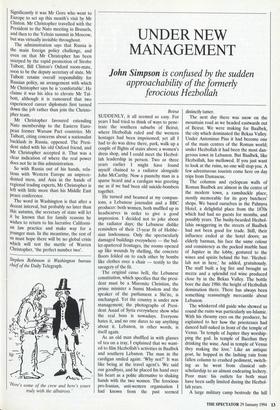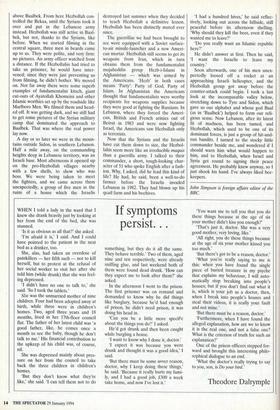UNDER NEW MANAGEMENT
John Simpson is confused by the sudden
approachability of the formerly ferocious Hezbollah
Beirut SUDDENLY, it all seemed so easy. For years I had tried to think of ways to pene- trate the southern suburbs of Beirut, where Hezbollah ruled and the western hostages had been imprisoned; yet all I had to do was drive there, park, walk up a couple of flights of stairs above a women's dress shop, and I could meet the Hezbol- lah leadership in person. Two or three years earlier I might have found myself chained to a radiator alongside John McCarthy. Now a paunchy man in a sparse beard and a cardigan was greeting me as if we had been old suicide-bombers together.
He turned and beamed at my compan- ions, a Lebanese journalist and a BBC producer: both women, both muffled up in headscarves in order to give a good impression. I decided not to joke about the radiator days; the Lebanese dislike reminders of their 15-year fit of Hobbe- sian lawlessness. Only the spectacularly damaged buildings everywhere — the bul- let-spattered frontages, the rooms opened up like wounds by shelling, the concrete floors folded on to each other by bombs like clothes over a chair — testify to the savagery of the fit.
The original casus belli, the Lebanese constitution, which specifies that the presi- dent must be a Maronite Christian, the prime minister a Sunni Moslem and the speaker of the parliament a Shi'ite, is unchanged. Yet the country is under new management; the photographs of Presi- dent Assad of Syria everywhere show who the real boss is nowadays. Everyone hates it, and no one dares to say anything about it. Lebanon, in other words, is itself again.
As an old man shuffled in with glasses of tea on a tray, 1 explained that we want- ed to film Hezbollah's activities in Baalbek and southern Lebanon. The man in the cardigan smiled again: 'Why not?' It was like being at the travel agent's. We said our goodbyes, and he placed his hand over his heart as a polite alternative to shaking hands with the two women. The ferocious pro-Iranian, anti-western organisation I had known from the past seemed distinctly tamer.
The next day there was snow on the mountain road as we headed eastwards out of Beirut. We were making for Baalbek, the city which dominated the Bekaa Valley. Under Antoninus Pius it had become one of the main centres of the Roman world; under Hezbollah it had been the most dan- gerous town in Lebanon. But Baalbek, like Hezbollah, has mellowed. If you just want to look at the ruins, no one will stop you. A few adventurous tourists come here on day trips from Damascus.
The columns and cyclopean walls of Roman Baalbek are almost in the centre of the modern town, a ramshackle place, mostly memorable for its gory butchers' shops. We based ourselves in the Palmyra Hotel, a delightful place from the 1870s which had had no guests for months, and possibly years. The bushy-bearded Hezbol- lahis swaggering in the streets of Baalbek had not been good for trade. Still, their influence ended at the hotel doors; an elderly barman, his face the same colour and consistency as the pocked marble bust of Jupiter in the lobby, gestured to the wines and spirits behind the bar. `Hezbol- lah not in here,' he added, gratuitously. The staff built a log fire and brought us mezze and a splendid red wine produced close by in the Bekaa Valley. The bottle bore the date 1986: the height of Hezbollah domination there. There has always been something reassuringly mercantile about Lebanon.
The whiskered old guide who showed us round the ruins was particularly un-Islamic.
With his rheumy eyes on the producer, he explained to her how the priestesses had danced half-naked in front of the temple of Venus. 'In temple of Jupiter they worship- ping the god. In temple of Bacchus they drinking the wine. And in temple of Venus they making the love.' Like an antique goat, he hopped in the lashing rain from fallen column to crashed pediment, switch- ing as he went from classical sub- scholarship to an almost endearing lechery. Poor man: his outlets for both must have been sadly limited during the Hezbol- lah years.
A large military camp bestrode the hill above Baalbek. From here Hezbollah con- trolled the Bekaa, until the Syrians took it over and put in the Lebanese army instead. Hezbollah was still active in Baal- bek, but not, thanks to the Syrians, like before. When we started filming in the central square, three men in beards came up to us. They were polite, and very firm: no pictures. An army officer watched from a distance. If the Hezbollahis had tried to take us prisoner, he would have inter- vened; since they were just preventing us from filming, he didn't bother. We moved on. Not far away there were some superb examples of fundamentalist kitsch, giant cut-outs of Ayatollah Khomeini and other Islamic worthies set up by the roadside like Marlboro Men. We filmed them and head- ed off. It was getting dark, and we still had to get some pictures of the Syrian military camp that dominated the approach to Baalbek. That was where the real power lay now.
A day or so later we were in the moun- tains outside Sidon, in southern Lebanon. Half a mile away, on the commanding heights deep in Lebanese territory, was an Israeli base. Most afternoons it opened up on the pro-Hezbollah villages nearby with a few shells, to show who was boss. We were being taken to meet the fighters, and we came across them unexpectedly, a group of five men in the ruins of a house which the Israelis destroyed last summer when they decided to teach Hezbollah a definitive lesson. Hezbollah has been distinctly muted ever since.
The guerrillas we had been brought to see were equipped with a Soviet surface- to-air missile-launcher and a new Ameri- can mortar. Hezbollah still seems to get its weapons from Iran, which in turn obtains them from the fundamentalist mujaheddin group Hezb-i-Islami in Afghanistan — which was armed by the Americans. 'Hezb' in both cases means 'Party': Party of God, Party of Islam. In Afghanistan the Americans thought that fundamentalists were worthy recipients for weapons supplies because they were good at fighting the Russians. In Lebanon, where they forced the Ameri- can, British and French armies out of Beirut in 1983 and were now fighting Israel, the Americans saw Hezbollah only as terrorists.
Now that the Syrians and the Israelis have cut them down to size, the Hezbol- lahis seem more like an irreducible maquis than a guerrilla army. I talked to their commander, a short, tough-looking char- acter of 51 who spoke English after a fash- ion. Why, I asked, did he lead this kind of life? He had, he said, been a well-to-do farmer before the Israelis invaded Lebanon in 1982. They had blown up his quail farm and his beehives. `I had a hundred hives,' he said reflec- tively, looking out across the hillside, still peaceful before its afternoon shelling. `Why should they kill the bees, even if they wanted me to leave?'
'Do you really want an Islamic republic here?'
He didn't answer at first. Then he said, `I want the Israelis to leave my country.'
Soon afterwards, one of his men unex- pectedly loosed off a rocket at an approaching Israeli helicopter, and the Hezbollah group got away before the counter-attack could begin. I took a last look at the incomparable valley below, stretching down to Tyre and Sidon, which gave us our alphabet and whose god Baal (as in 'Baalbek') helped to form our reli- gious sense. Now Lebanon, after its latest fit of madness, has been tamed, and Hezbollah, which used to be one of its dominant forces, is just a group of hit-and- run bandits. I turned to the stocky little commander beside me, and wondered if I should warn him what would happen to him, and to Hezbollah, when Israel and Syria get round to signing their peace agreement. He probably knew anyway, so I just shook his hand. I've always liked bee- keepers.
John Simpson is foreign affairs editor of the BBC.



































































 Previous page
Previous page